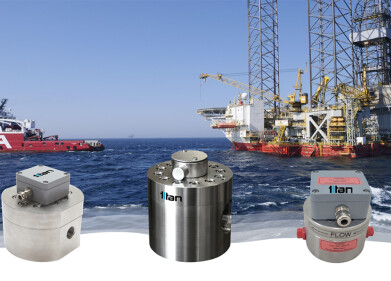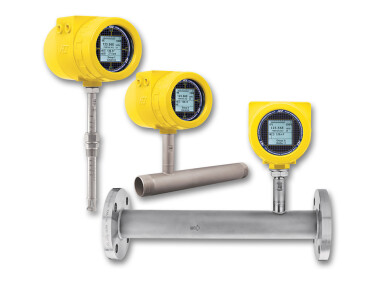Flow level pressure
Using process monitoring for LCAs and sustainability certification
Mar 27 2025
In the petrochemical sector, increasing regulatory demands, investor expectations, and supply chain requirements are driving a shift toward demonstrable environmental performance.
Life Cycle Assessments (LCAs) and sustainability certifications—such as ISO 14001, Responsible Care®, and EcoVadis—are now central tools in communicating and verifying a company's environmental footprint.
For process managers, one of the most effective ways to contribute to these initiatives lies in the systems already in place: process monitoring instruments.
These tools are not only essential for operational control but are also increasingly critical in providing the quantitative data needed for LCAs and certification processes.
Enhancing Life Cycle Assessments with instrumentation data
LCAs rely on detailed, accurate data to assess the environmental impact of a product or process across its life cycle. In petrochemical operations, this typically includes upstream feedstock extraction, on-site processing, emissions, energy use, water consumption, and waste generation.
Process monitoring instruments provide high-resolution data at the unit operation level, improving the precision and credibility of LCAs. Examples include:
-
Mass and volumetric flow meters for quantifying raw material and product throughput.
-
Energy meters (electric, steam, gas) for assessing energy intensity per unit of production.
-
Gas analyzers for continuous emissions monitoring (e.g., CO₂, NOₓ, SOₓ, VOCs).
-
Online water quality sensors (e.g., pH, conductivity, turbidity) for wastewater and cooling systems.
-
Waste tracking systems, including tank level sensors and load cell systems, for solid and liquid process residues.
In LCAs, data granularity directly affects the ability to identify environmental "hotspots" and prioritize mitigation strategies. Real-time or time-series data from instruments can replace estimations and generic emission factors, leading to more accurate cradle-to-gate or gate-to-gate assessments.
Achieving sustainability certifications with continuous monitoring
Many environmental management and sustainability certification frameworks require evidence of ongoing measurement, monitoring, and improvement. Process instrumentation systems provide the continuous data streams needed to meet these requirements. Key examples include:
-
ISO 14001 (Environmental Management Systems): Requires documented procedures for monitoring and measuring environmental performance. Instruments enable compliance by supplying traceable, timestamped data.
-
Responsible Care®: Emphasizes performance metrics and transparency. Instrumentation supports KPIs related to emissions, energy use, and resource efficiency.
-
EcoVadis and CDP (formerly Carbon Disclosure Project): Require detailed disclosures of Scope 1 and 2 greenhouse gas emissions, energy consumption, and water use, which depend heavily on reliable monitoring infrastructure.
Process monitoring also supports internal audits and external verification, as data from instruments can be archived, retrieved, and validated as part of documentation reviews.
Integration of operational and environmental data systems
Many plants maintain a separation between environmental reporting and process operations, but integrated data management can reduce duplication and improve accuracy. Modern instrumentation systems, often part of a Distributed Control System (DCS) or SCADA network, can be linked to:
-
Environmental Management Information Systems (EMIS): For centralized reporting.
-
LCA software tools: Such as GaBi or SimaPro, which can import process data.
-
Enterprise Resource Planning (ERP) systems: To link production and sustainability metrics.
Automated data pipelines reduce the risk of human error, streamline reporting, and allow for more frequent updates to environmental performance models.
Strategic value for process managers
By leveraging process instrumentation beyond traditional operational parameters, process managers can play a central role in their organization's sustainability strategy. Benefits include:
-
Improved benchmarking of process efficiency and environmental intensity.
-
Faster identification of deviations and corrective actions in regulated discharges or emissions.
-
Enhanced credibility of reported data during audits or certification assessments.
-
Reduced reliance on estimated or default values in sustainability disclosures.
In the long term, process data will become increasingly important for digital ESG (Environmental, Social, and Governance) reporting, carbon pricing mechanisms, and low-carbon product certification schemes.
In petrochemical facilities, process monitoring instruments are no longer limited to safety, throughput, and quality control. They are essential tools for environmental data collection, providing the empirical basis for LCAs and sustainability certifications. By integrating these systems into broader environmental performance frameworks, companies can enhance the transparency, accuracy, and strategic value of their sustainability efforts.
Process managers, with their direct oversight of these data systems, are in a pivotal position to bridge operational performance and environmental accountability.
Digital Edition
PIN 26.1 Feb/Mar 2025
March 2025
Analytical Instrumentation - Elemental Analysis for Quality and Process Control at Refineries, for Lubricants and Wear Metals in Engine Oils - Synthetic Lubricants: New Developments - Scaling...
View all digital editions
Events
Apr 02 2025 Saigon, Vietnam
Apr 02 2025 Atyrau, Kazakhstan
Apr 08 2025 Birmingham, UK
Apr 08 2025 Kielce, Poland
Apr 08 2025 Ravenna, Italy



















